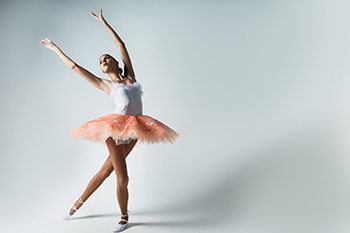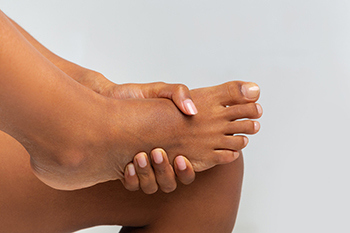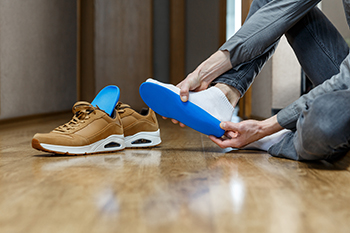
In the world of dance and sports, foot injuries are unfortunately common but manageable with proper care. Dancers, in particular, are prone to conditions like stress fractures, tendonitis, and ankle sprains due to repetitive movements and intense physical demands. These injuries often stem from overuse, improper technique, or inadequate footwear. Relief typically involves gentle stretching and strengthening exercises. However, an accurate diagnosis and targeted treatment plans are key, making a podiatrist's expertise invaluable. This type of foot doctor can offer specialized care and recommend strategies tailored to a dancer's unique needs. If you are experiencing persistent pain or suspect a foot injury, a podiatrist can help you recover effectively and safely, ensuring you can return to your passion for dance with confidence and reduced risk of recurrence. It is suggested that you schedule an appointment with a podiatrist today.
Ankle and foot injuries are common among athletes and in many sports. They can be caused by several problems and may be potentially serious. If you are feeling pain or think you were injured in a sporting event or when exercising, consult with one of our podiatrists from Bruening Foot & Ankle. Our doctors will assess your condition and provide you with quality foot and ankle treatment.
Common Injuries
The most common injuries that occur in sporting activities include:
- Achilles Tendonitis
- Achilles Tendon Rupture
- Ankle Sprains
- Broken Foot
- Plantar Fasciitis
- Stress Fractures
- Turf Toe
Symptoms
Symptoms vary depending upon the injury and in some cases, there may be no symptoms at all. However, in most cases, some form of symptom is experienced. Pain, aching, burning, bruising, tenderness, tightness or stiffness, sensation loss, difficulty moving, and swelling are the most common symptoms.
Treatment
Just as symptoms vary depending upon the injury, so do treatment options. A common treatment method is known as the RICE method. This method involves rest, applying ice, compression and elevating the afflicted foot or ankle. If the injury appears to be more serious, surgery might be required, such as arthroscopic or reconstructive surgery. Lastly, rehabilitation or therapy might be needed to gain full functionality in the afflicted area. Any discomfort experienced by an athlete must be evaluated by a licensed, reputable medical professional.
If you have any questions, please feel free to contact our offices located in Covina and Alta Loma, CA . We offer the newest diagnostic and treatment technologies for all your foot care needs.

Who said style can't be comfortable? With Custom Orthotics, you get the best of both worlds. Slip them into your favorite fashionable shoes and feel the difference. They mold to your feet, offering support without compromising on style. No more choosing between looking good and feeling great. With Custom Orthotics, step out in style and comfort every day. Contact our office to learn more!

Throughout your life, your feet will carry you thousands of miles, enduring wear and tear that can lead to various common foot problems. Aging feet are prone to widening and arch collapse, which can increase the likelihood of issues like plantar fasciitis, flat feet, and osteoarthritis. Regular self-examinations can help you identify early signs of trouble, such as calluses, blisters, and discolored toenails, which may require changes in footwear or custom orthotics. Plantar fasciitis, marked by heel pain, often benefits from performing specific exercises, and supportive shoe inserts. Flat feet, where your arches have flattened out, can cause discomfort and swelling, best managed with orthotic inserts and shoes with arch support. Additionally, osteoarthritis in your feet can lead to joint pain and stiffness, manageable through topical pain relievers, anti-inflammatory medications, and sometimes corticosteroid injections. Proactive foot care and seeking timely treatment for foot problems are important ways to maintain your mobility and improve quality of life. If you are experiencing persistent foot pain or discomfort, it is suggested that you schedule an appointment with a podiatrist for specialized foot care.
Everyday foot care is very important to prevent infection and other foot ailments. If you need your feet checked, contact one of our podiatrists from Bruening Foot & Ankle. Our doctors can provide the care you need to keep you pain-free and on your feet.
Everyday Foot Care
Often, people take care of their bodies, face and hair more so than they do for their feet. But the feet are a very important aspect of our bodies, and one that we should pay more attention to. Without our feet, we would not be able to perform most daily tasks.
It is best to check your feet regularly to make sure there are no new bruises or cuts that you may not have noticed before. For dry feet, moisturizer can easily be a remedy and can be applied as often as necessary to the affected areas. Wearing shoes that fit well can also help you maintain good foot health, as well as making it easier to walk and do daily activities without the stress or pain of ill-fitting shoes, high heels, or even flip flops. Wearing clean socks with closed shoes is important to ensure that sweat and bacteria do not accumulate within the shoe. Clean socks help to prevent Athlete’s foot, fungi problems, bad odors, and can absorb sweat.
If you have any questions please feel free to contact our offices located in Covina and Alta Loma, CA . We offer the newest diagnostic and treatment technologies for all your foot and ankle needs.
 Plantar fasciitis is a common condition characterized by pain and inflammation of the plantar fascia, the thick band of tissue that runs along the bottom of the foot. This pain is often most severe in the morning or after periods of rest. Choosing the right custom orthotic, either hard or soft, is important for effective treatment. Hard orthotics, typically made from materials like carbon fiber or plastic, provide firm support and stability. They help to correct abnormal foot mechanics and maintain proper alignment, reducing strain on the plantar fascia. These are particularly beneficial for individuals with significant biomechanical issues. Soft orthotics, made from cushioned materials like EVA foam or gel, offer greater shock absorption and comfort. They are ideal for individuals who need additional cushioning and pressure relief, particularly if they have a sensitive or painful heel. Both types of orthotics can help alleviate the symptoms of plantar fasciitis, but the choice depends on individual needs and the severity of the condition. If you have persistent pain from plantar fasciitis, it is suggested that you make an appointment with a podiatrist to determine which type of custom orthotic will provide the most benefit for your specific case.
Plantar fasciitis is a common condition characterized by pain and inflammation of the plantar fascia, the thick band of tissue that runs along the bottom of the foot. This pain is often most severe in the morning or after periods of rest. Choosing the right custom orthotic, either hard or soft, is important for effective treatment. Hard orthotics, typically made from materials like carbon fiber or plastic, provide firm support and stability. They help to correct abnormal foot mechanics and maintain proper alignment, reducing strain on the plantar fascia. These are particularly beneficial for individuals with significant biomechanical issues. Soft orthotics, made from cushioned materials like EVA foam or gel, offer greater shock absorption and comfort. They are ideal for individuals who need additional cushioning and pressure relief, particularly if they have a sensitive or painful heel. Both types of orthotics can help alleviate the symptoms of plantar fasciitis, but the choice depends on individual needs and the severity of the condition. If you have persistent pain from plantar fasciitis, it is suggested that you make an appointment with a podiatrist to determine which type of custom orthotic will provide the most benefit for your specific case.
If you’re experiencing foot discomfort, have a history of foot and ankle injuries, or are interested in exploring Custom orthotics, don’t hesitate to contact one of our podiatrists at Bruening Foot & Ankle. Our doctors is dedicated to offering the care required to help you remain pain-free and stay on your feet.
What are Custom Orthotics?
Custom orthotics refer to custom inserts designed for placement in different shoe types, including athletic and formal footwear, with the purpose of alleviating a spectrum of foot-related problems such as flat feet, heel pain, and overall foot discomfort. These inserts are instrumental in providing relief and comfort for a diverse range of foot conditions, including heel pain, and can also act as a proactive approach to injury prevention.
Medical Grade Shoe Inserts:
A diverse array of shoe inserts is available for addressing foot pain, heel discomfort, and minor issues. For instance, you can place arch supports in your shoes to rectify overarched or flat feet, and gel and cushioned insoles are frequently chosen for the comfort and relief they provide from foot and heel pain by reducing pressure.
If you have any questions please contact our offices located in Covina and Alta Loma, CA . We offer the newest diagnostic and treatment technologies for all your foot and ankle needs.
